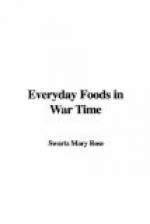On account of its concentration, fat is good for transportation; and aside from its energy value it gives the diet “staying” qualities. Other things being equal, one feels hungry sooner after a meal without fat than after one in which it is liberally supplied. People doing manual labor, and especially out of doors, feel the pangs of hunger more than sedentary folks and hence need more fat to keep them comfortable. No man can do his best work when all the time thinking how hungry he is. It behooves us all then, as good citizens, to recognize the greater need of our soldiers and sailors and our hard-working laborers for as liberal allowances of fat as we can make. At the same time, we cannot for our own best health dispense with fat altogether. We may consider anything up to two ounces apiece a day legitimate for our own maintenance of efficiency.
In departing from food customs there is a natural timidity lest the new food shall in some way be less healthful than the old. Recent scientific researches have revealed a hitherto unsuspected property in butter, a discovery which has aroused some concern as to whether we can safely substitute other fats for it. Young animals fed on a diet of highly purified food materials in which lard is the only kind of fat may seem fairly well but do not grow normally, while those fed the same diet in every respect except that the lard is replaced by butter grow as young animals should and are more resistant to disease. Study of other food fats shows that they may be divided into two groups, one with this growth promoting property and one without it. In general, the vegetable oils do not have it, while butter and beef oil do; on the other hand, lard does not have it, while the oil from corn does. Careful analysis of the situation has shown that a fat-soluble vitamine is present which can in the laboratory be separated from the fat. This same vitamine is present in a variety of food materials—in whole milk, in egg yolks, in leaves of plants—but we have not studied it long enough to know just how much spinach we can substitute for a tablespoonful of butter so far as the vitamine is concerned. We must await further investigations. But we may rest assured that with a fairly liberal amount of milk and some green vegetables, possibly some beef fat, we need not fear any disastrous consequences from the substitution of some other fat for butter. Where the diet is limited and the entire quantity of fat is not very large, it seems prudent to select oleomargarine made largely from beef oil and, where circumstances permit its use without the sacrifice of any other dietary essential, to use butter in the diet of growing children unless they get a full quart of milk apiece a day.




